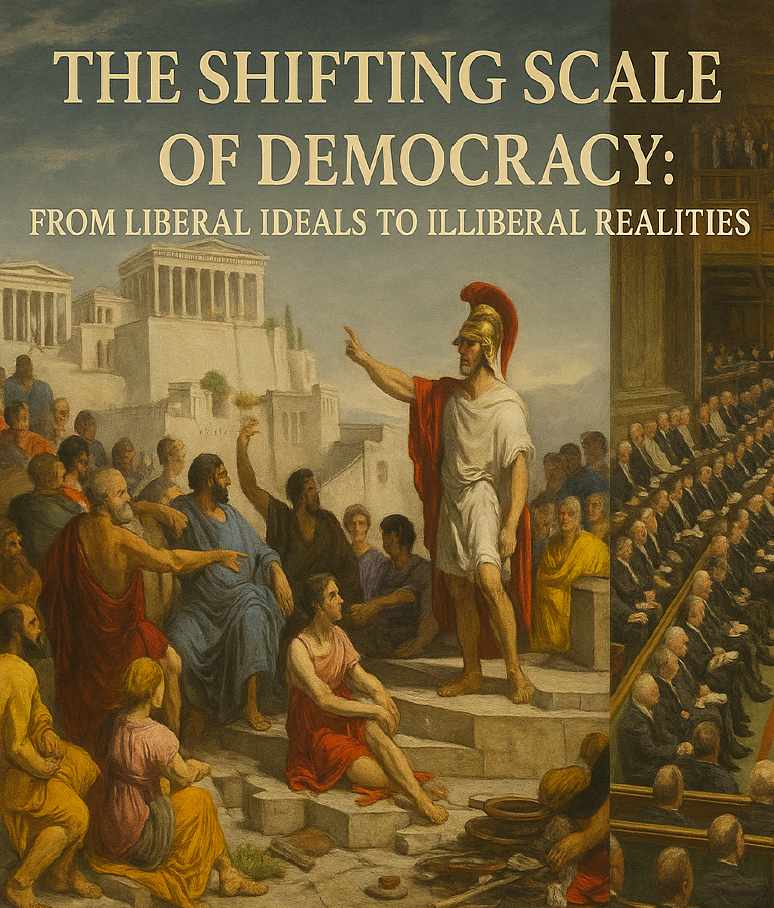
Democratic Decline and Operational Risk
A Call to Attention
In today’s complex and volatile geopolitical environment, the assumptions that once underpinned global stability are rapidly eroding. Among the most consequential of these is the belief that liberal democracy represents the inevitable political endpoint for nations across the world. That teleological belief no longer holds. Around the globe, we are witnessing an accelerating trend: the rise of illiberal democracies, the resurgence of autocratic tendencies, and the quiet unraveling of fundamental liberties.
For companies and NGOs operating internationally, this is not an abstract concern. The nature of a political regime directly influences the stability of markets, the reliability of contracts, the resilience of institutions, and the safety of personnel. Political risk is not simply about coups or elections. It is about the deeper structures of governance, such as who holds power, how they wield it, and whether rule of law, civil liberties, and institutional independence can be relied upon.
This report, The Shifting Scale of Democracy, provides a framework for understanding the evolution of democratic governance along a spectrum, from liberal democracies with robust checks and balances to illiberal democracies and hybrid regimes where democratic forms mask autocratic realities. It introduces the Democracy Scale as a diagnostic tool for analysts, investors, and decision-makers who must evaluate not only where a country stands today, but where it may be headed tomorrow.
At a time when democratic backsliding is becoming the norm rather than the exception, we cannot afford to be reactive. We must be anticipatory. This report equips our clients and partners with the insights they need to navigate the shifting terrain of global politics—so that operational risk is not just managed but truly understood.
Nathan Ackerman
Managing Partner
Riley Risk, Inc.
Introduction
In the modern political imagination, democracy is often assumed to be synonymous with liberal democracy, a system defined by free and fair elections, constitutional constraints on power, individual rights, and institutional checks and balances. But the reality of global politics in the 21st century tells a different story. Liberal democracy is in retreat. In its place, a more ambiguous and troubling model has risen: illiberal democracy. This form of governance retains the trappings of democracy, such as elections, parliaments, and populist rhetoric, while hollowing out its liberal foundations. As Fareed Zakaria warned in his 1997 essay, "The Rise of Illiberal Democracy," "democracy without constitutional liberalism is producing centralized regimes, the erosion of liberty, the abuse of power, ethnic divisions, and even war." The global trend away from liberal norms is not merely a temporary crisis but a structural shift in how democratic legitimacy is being defined. As such, understanding the distinctions among types of democracies is essential to assessing the state of democracy in the world today.
Liberal, Illiberal, and Republican Traditions
Liberal democracy rests on a synthesis of electoral legitimacy and liberal constitutionalism. It combines majority rule with protections for individual rights, judicial independence, and freedom of expression. Rooted in Enlightenment thinkers such as John Locke and John Stuart Mill, liberal democracy views the state as a neutral guarantor of rights, tasked with protecting the autonomy of individuals from arbitrary interference. Its institutional structure includes separation of powers, free media, independent judiciaries, and protections for minorities against the tyranny of the majority.
In contrast, illiberal democracy retains democratic procedures while stripping away liberal constraints. As Zakaria describes, it is a system where "elections are held, but civil liberties are regularly violated." Leaders in Hungary, Turkey, and India have all used democratic mandates to weaken judicial independence, repress dissent, and curtail press freedoms. Illiberal democracies often appeal to national identity, religious values, or majoritarian will to justify the erosion of pluralism. What remains is democracy reduced to a numbers game, where the consent of the majority becomes a license to dismantle liberal safeguards.
Majoritarianism, as Alexis de Tocqueville warned in Democracy in America, can become a form of tyranny: "The moral empire of the majority is founded in part on the idea that there is more enlightenment and wisdom in many men united than in one man alone." But Tocqueville also saw how the majority, if unchecked, could impose its will in ways just as oppressive as a monarchy. Illiberal democracy embodies this risk: it converts democratic legitimacy into a blunt instrument of domination.
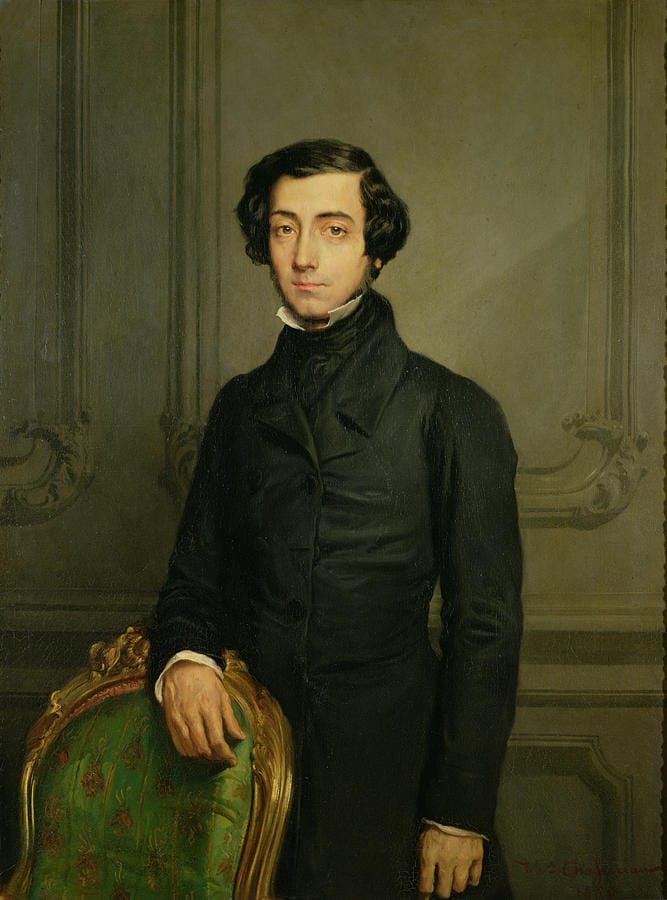
An often-overlooked alternative to both liberalism and majoritarianism is classical republicanism. Historically, republicanism referred to a model of government grounded in mixed institutions, popular representation, and the rule of law. Ancient Rome, Renaissance Florence, and the early modern Dutch and English republics all exemplified forms of republican government. The American Founders adapted this tradition into a system that blended democratic elections with constitutional checks and institutional balance.
Republicanism, in this analytical sense, can be viewed as a framework of representative government that prioritizes rule-based governance over direct expression of popular will. It is distinct from both liberalism (which centers on individual rights) and pure majoritarianism (which privileges the majority above all else). Republican systems typically emphasize deliberative assemblies, legal norms, and political stability. The emphasis is not simply on who rules, but on the architecture of how government functions to restrain power, ensure continuity, and channel citizen participation through stable institutions.
Majoritarianism in Practice: The Case of the United Kingdom
In distinction to liberal/illiberal democracies and republics is majoritarianism, which refers to a political system in which decisions are made based on the will of the majority, often without strong institutional protections for minority rights or dissent. While often associated with illiberal democracies, majoritarian dynamics can also be found within established democracies, particularly those with parliamentary systems and weak constitutional constraints. The United Kingdom is a notable example. As a unitary parliamentary democracy with no written constitution, power in the UK is highly centralized in the executive-legislative majority. The First Past the Post electoral system often yields disproportionate majorities in Parliament, enabling governments to pass sweeping legislation without needing broad consensus. Recent developments suggest the UK is shifting toward a more majoritarian posture at the expense of civil liberties. For example:
- The Police, Crime, Sentencing and Courts Act (2022) significantly restricts the right to protest by granting police expanded powers to shut down demonstrations deemed disruptive.
- The Online Safety Bill, while framed as a means to protect children and combat harmful content, has raised alarms among civil liberties groups for potentially curbing freedom of speech online.
- The UK has set law enforcement to the homes of people who post “hateful comments” online, arrested a man for praying in public, and even threatened to extradite Americans for what they say in their home country.

These measures reflect a broader trend in which the majority’s will—expressed through electoral mandates—is increasingly used to justify curtailing fundamental liberties. The UK remains a democracy, but its liberal foundations are being slowly reshaped by a majoritarian logic that prioritizes political expediency over constitutional restraint.
Global Trends and Democratic Backsliding
Recent democracy indices reflect the global shift away from liberal norms. According to the 2024 Freedom House report, global freedom has declined for the 18th consecutive year, with more countries registering net losses in political rights and civil liberties than gains. The Economist Intelligence Unit's 2023 Democracy Index noted that only 8% of the world's population lives in a "full democracy," while over a third lives under some form of authoritarian rule. Meanwhile, the Varieties of Democracy (V-Dem) Project reports a sharp rise in "autocratization," driven not by coups or revolutions but by gradual erosion of democratic norms within elected governments.
Illiberal democracies often emerge through democratic means. Leaders come to power through elections, then consolidate their position by weakening checks on authority. Viktor Orbán’s declaration that Hungary is a "illiberal state" rooted in Christian and national values exemplifies this shift. Similarly, Recep Tayyip Erdogan has used electoral victories to justify constitutional changes that expand presidential powers. In India, Narendra Modi's government has been accused of eroding press freedom, undermining judicial independence, and using nationalism to marginalize religious minorities. These regimes still claim the mantle of democracy but reject its liberal core. However, it is important to note that because they remain democratic, they are representing the will and values of the people.
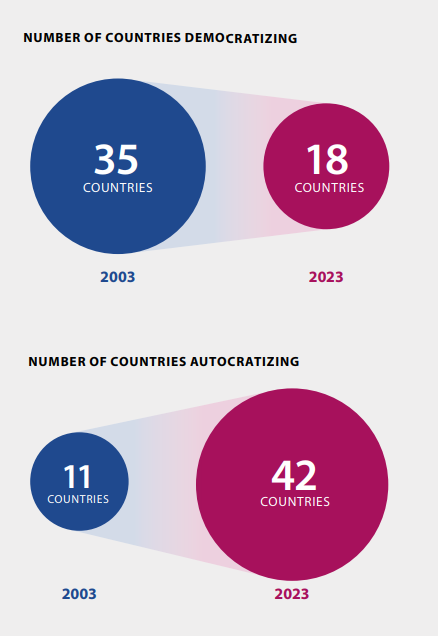
The Scale of Democracy Today
Democracy today exists along a scale, not a singular form. Liberal democracy, with its careful balancing of majority rule and individual rights, remains the ideal for many, but it is increasingly under threat. Illiberal democracy, in contrast, offers a simplified vision of democracy as electoral dominance, often at the expense of civil liberties and institutional independence. Majoritarianism, while not always authoritarian, can erode liberal protections when unchecked, even in long-standing democracies like the United Kingdom.
Republicanism, as a form of representative government grounded in institutional design and civic responsibility, provides an alternative model that emphasizes governance over raw majoritarian will. Its relevance lies not in nostalgia but in its analytical utility: it reminds us that how power is structured and constrained is as important as who wields it.
Essentially, the global landscape of democracy is fragmenting. Rather than a linear progression toward liberal ideals, analysts are witnessing a recalibration, a redistribution along the democratic scale. Some states are slipping into authoritarianism, others are veering into illiberal or majoritarian models, and a few are holding fast to liberal norms. Understanding these differences is essential for assessing where democracy is today and where it might be headed tomorrow.
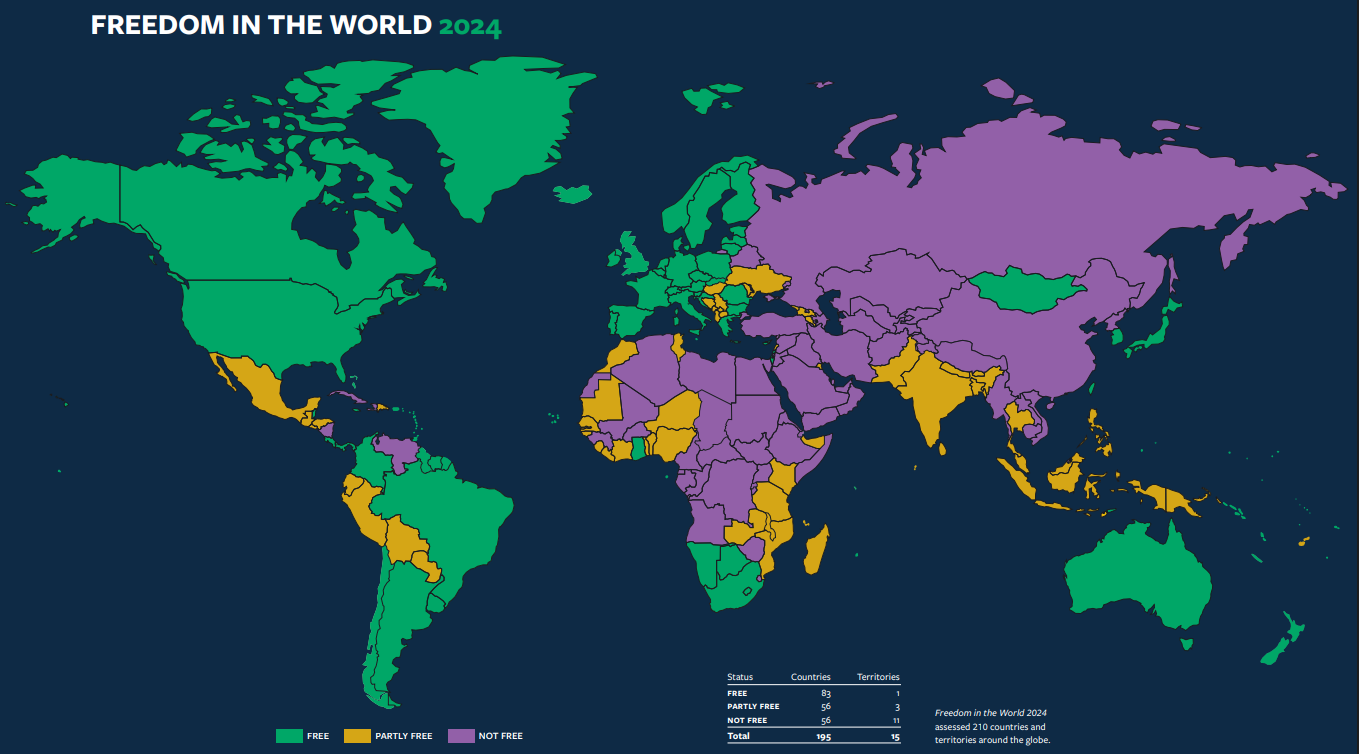
Diagnosing Democratic Decline: Indicators of a Shift
In the above sections, we explored the concept of democracy as a spectrum, ranging from liberal democracy through illiberal and majoritarian forms, to hybrid and authoritarian regimes. While liberal democracy is commonly regarded as the normative model, the current global trajectory suggests a shift toward less liberal, more centralized, and frequently majoritarian modes of governance. Liberal democracies, characterized by institutional checks and individual rights, are giving way to regimes where elections persist but liberal norms erode. The rise of illiberal and majoritarian democracies signals a structural transformation in the meaning and practice of democratic legitimacy.
Using that as a conceptual framework, we can identify concrete indicators that a country is moving away from liberal democracy and toward more illiberal or majoritarian forms. Subsequently, this report introduces a practical typology, the Democracy Scale, which helps categorize different types of democratic systems and interpret the signs of democratic backsliding. The Democracy Scale is offered as a diagnostic tool, especially useful for analysts assessing political risk and regime stability.
Key Indicators of Democratic Decline
Democratic erosion does not usually occur overnight. Rather, it emerges through a gradual process in which laws, norms, and institutions are strategically restructured. Seven key indicators can help observers identify early warning signs of democratic decline.
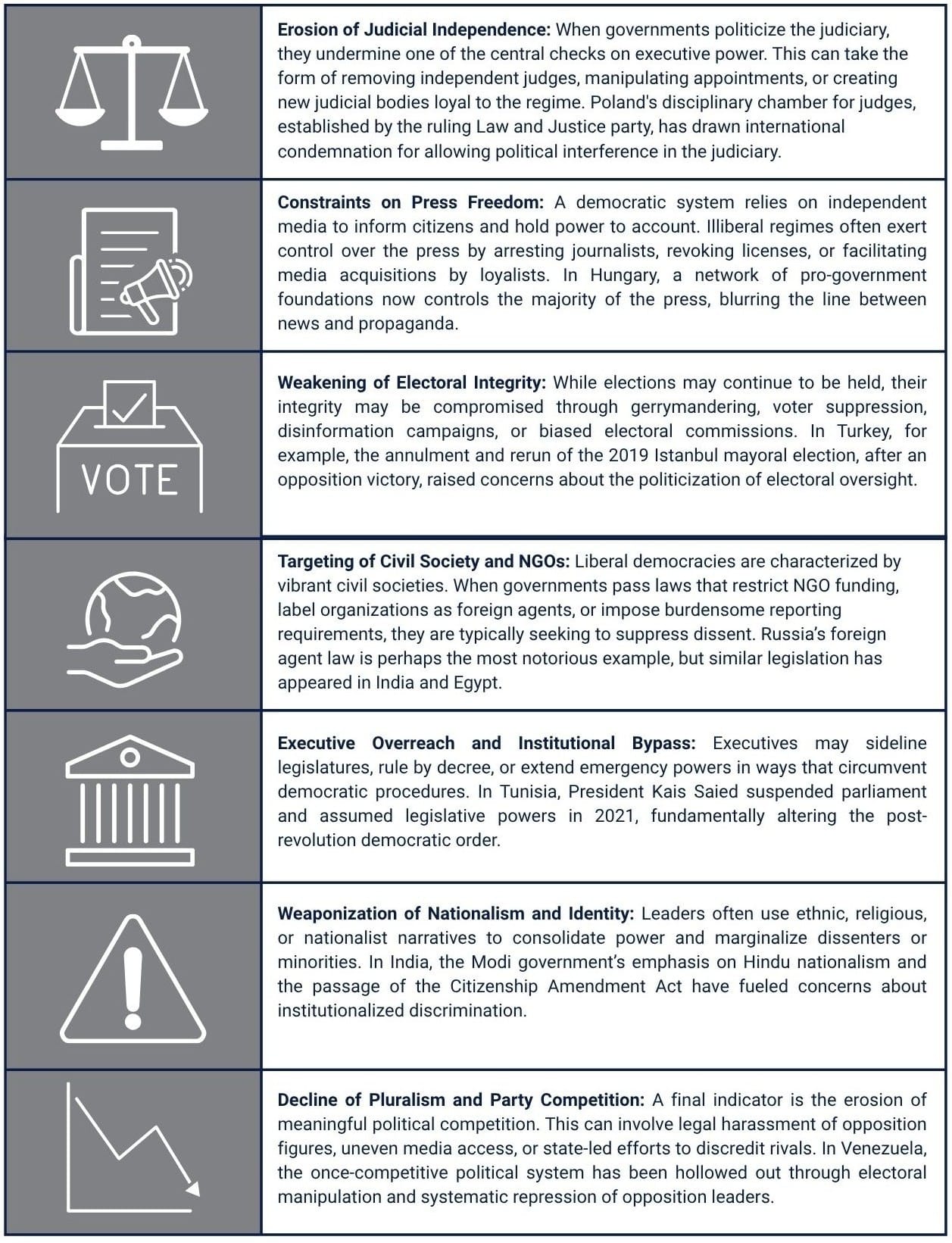
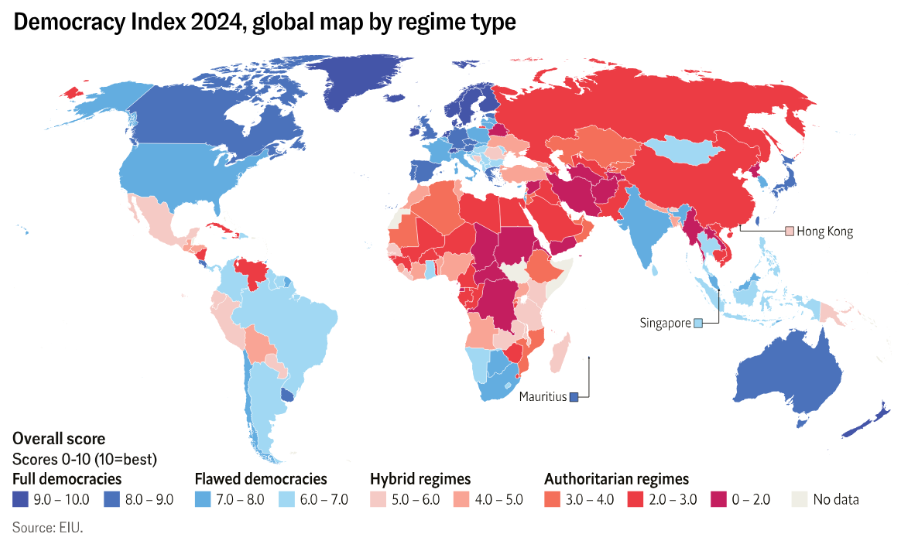
The Democracy Scale: A Typology of Regime Types
The Democracy Scale presented here is an original framework designed to complement, rather than replace, established indices like the Economist Intelligence Unit's Democracy Index and the Varieties of Democracy (V-Dem) project. While the EIU and V-Dem offer quantitative scores across broad categories, the Democracy Scale focuses on the functional attributes of political regimes and the sequence of decline. Where the EIU and V-Dem focus on rankings and scores, the Democracy Scale enables comparative political analysis over time. It is especially useful for those conducting country risk assessments, strategic forecasting, or human rights monitoring. It is especially useful as a diagnostic tool—helping analysts understand not only where a country stands, but how and why it may be shifting over time.

Short Case Studies
- Hungary: Under Prime Minister Viktor Orbán, Hungary has transitioned from liberal to illiberal democracy. Through constitutional amendments, centralized media ownership, and judicial restructuring, Orbán has neutralized checks on power while maintaining the facade of electoral legitimacy.
- India: Under Narendra Modi, India remains an electoral democracy but shows signs of both illiberal and majoritarian tendencies. Restrictions on press freedom, digital surveillance, religious polarization, and civil society constraints indicate democratic backsliding.
- United Kingdom: Traditionally a liberal democracy, the UK has exhibited features of majoritarianism in recent years. Legislation such as the Police, Crime, Sentencing and Courts Act and proposed reforms to the Human Rights Act signal a shift toward executive dominance and curtailed civil liberties.
- Tunisia: After years as a promising post-Arab Spring democracy, Tunisia has regressed into a hybrid regime. President Saied's suspension of parliament and consolidation of power under emergency authority undermines democratic norms.
- Brazil: Under former President Jair Bolsonaro, Brazil experienced a decline in democratic standards. Bolsonaro’s attacks on the judiciary, disinformation campaigns, and threats to electoral legitimacy placed Brazil on the edge of illiberalism, though institutions largely held firm.
- Israel: Ongoing controversies surrounding judicial reform and the relationship between religious and secular legal frameworks have raised questions about the durability of liberal democracy in Israel. Efforts to constrain the judiciary have sparked mass protests, reflecting deep concern over institutional integrity.
- United States: Despite its long-standing democratic institutions, the U.S. has not been immune to democratic erosion. Events following the 2020 election, including attempts to overturn the results and politicization of election administration, reveal the vulnerabilities of even mature democracies.
A Tool for Political Risk and Democratic Forecasting
The Democracy Scale offers more than a theoretical model as it is a practical diagnostic tool for assessing political risk. By identifying specific indicators, such as judicial erosion, media consolidation, and executive overreach, analysts can better anticipate shifts in regime behavior, assess institutional resilience, and forecast challenges to democratic governance.
This framework is particularly useful in environments where elections alone are no longer a sufficient measure of democratic health. Political risk analysts, civil society observers, and international organizations can use the Democracy Scale to monitor trajectories of change, distinguish between temporary political turbulence and systemic decay, and design interventions accordingly. As the global consensus on liberal democracy fractures, the need for sharper analytical tools becomes urgent. The Democracy Scale allows analysts to map where countries stand not just by numbers, but by structure, process, and intent, equipping analysts to better understand the fragile, shifting terrain of 21st-century democracy.
Expert Analysis On-Demand: Request Support
Leverage RileySENTINEL's expert team for deeper analysis and tailored insights:
- On-demand consultations with our global network of advisors
- Custom reports focused on your specific operational contexts
- Proactive risk mitigation strategies for volatile environments
- In-depth analysis of regional stability factors and future outlooks
- Expedited response options for time-sensitive inquiries
Click this link to be redirected to the support request page.
RileySENTINEL: Global Insights. Local Expertise.






